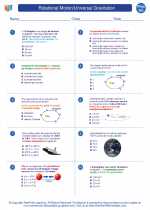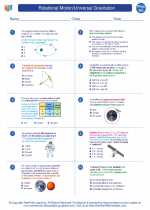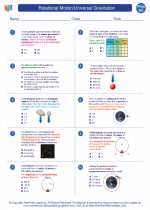High School Physics: Human Health
Introduction
Human health is a broad and complex topic that encompasses various aspects of physical, mental, and social well-being. In the context of physics, human health can be studied through the application of principles related to mechanics, energy, and thermodynamics. Understanding the physical aspects of human health can provide insights into topics such as biomechanics, the physics of medical imaging, and the effects of energy transfer on the human body.
Study Guide
Biomechanics and Human Motion
Biomechanics is the study of the mechanical aspects of living organisms, including the human body. It involves understanding how forces and torques affect human motion, and how the body responds to these mechanical influences. Key topics in biomechanics include:
- Newton's laws of motion and their application to human movement
- Muscle mechanics and the role of muscles in generating and controlling motion
- Biomechanical principles of common human movements such as walking, running, and jumping
Physics of Medical Imaging
Medical imaging techniques such as X-rays, MRI, and CT scans are essential tools for diagnosing and monitoring various health conditions. These techniques are based on the principles of physics and involve the interaction of energy with the human body. Key topics in the physics of medical imaging include:
- Interactions of X-rays and electromagnetic waves with human tissues
- Principles of magnetic resonance and nuclear magnetic resonance for imaging
- Role of contrast agents in enhancing the visibility of specific tissues and organs
Energy Transfer and Health
The human body relies on the efficient transfer and utilization of energy for various physiological processes. Understanding the principles of energy transfer can provide insights into topics such as metabolic processes, thermoregulation, and the effects of external energy sources on human health. Key topics in energy transfer and health include:
- Metabolic energy pathways and the conversion of food energy into cellular energy
- Thermodynamics of human body temperature regulation and heat transfer mechanisms
- Effects of external energy sources such as radiation and electromagnetic fields on human health
Conclusion
Studying human health from a physics perspective offers valuable insights into the mechanical, energetic, and thermodynamic aspects of the human body. By understanding the physical principles that underlie various aspects of human health, students can develop a deeper appreciation for the interconnectedness of physics and biology in the context of human well-being.
[Human Health] Related Worksheets and Study Guides:
.◂Physics Worksheets and Study Guides High School. Rotational Motion/Universal Gravitation

 Worksheet/Answer key
Worksheet/Answer key
 Worksheet/Answer key
Worksheet/Answer key
